Thailand's military has seized control of the country and suspended the constitution after rival factions failed in negotiations to end six months of political turmoil – resulting in the nation's 19th coup in 82 years.
While the head of the army, General Prayuth Chan-ocha, did not use the word "coup" in his televised statement, he said the takeover was necessary "in order for the country to return to normality quickly". He added that the army, armed forces, air force and police would seize power as of 4.30pm local time on Thursday and would help "reform the political structure, the economy and society".
He said: "It is necessary for the Peace and Order Maintaining Command – which includes army, navy, armed forces and police – to take control of governing the country."
In a separate televised statement, an army spokesman told the acting prime minister, Niwatthamrong Boonsongphaisan, and his ministers to report to a military compound in the north of Bangkok.
Winthai Suvaree said the country's constitution was being suspended but the senate and all courts would continue to function.
Thursday's sudden announcement followed an unexpected enactment of martial law just two days earlier after the military cited the need to "restore and maintain order" following six months of sometimes bloody protests that have left Thailand in legislative paralysis.
The political fighting has seen 28 people killed and more than 700 injured since November when anti-government protesters began calling for the removal of the Pheu Thai government.
Rival political factions have spent the past two days at Bangkok's Army Club, where they attempted to come to a compromise over the future of the country. Despite various options reportedly being floated at the Prayuth-mediated talks, no agreement was reached, although the rival leaders did tweet "selfies" of themselves smiling and laughing together at the round-table discussions.
On Thursday afternoon, witnesses said, hundreds of extra troops arrived at the venue and took away the leader of the anti-government protests, Suthep Thaugsuban. It remains unclear who else was detained. Members of the government, opposition party, senate, election commission and pro-government forces had been attending the talks.
The military announced a curfew from 10pm-5am. National television stations were off air, although social media and the internet seemed unaffected by any censorship.
Mark Kent, the British ambassador, tweeted: "The Thai military have announced a coup. British citizens should exercise extreme caution and follow travel advice and media updates."
Prayuth's announcement was met with a warning by the pro-government "redshirt" activists' group. The United Front for Democracy against Dictatorship (UDD) vowed "retaliation" shortly after the televised statement.
"NOW it is COUP – stand by for a retaliation from the UDD," the group tweeted.
Soldiers later fired into the air to disperse thousands of redshirt activists who had gathered in Bangkok's western outskirts.
For the past six months, protesters have taken to the streets, taken over government buildings and threatened political kidnappings in an attempt to remove the "Shinawatra clan" from power – a reference to the former prime minister Thaksin Shinawatra, who was deposed by a military coup in 2006 and whose party, or variations of it, have won every election in Thailand since 2001.
Thailand has seen 19 real or attempted coups since the end of absolute monarchy in 1932.
Thursday's coup follows a softer so-called "judicial coup" this month in which Thaksin's sister, Yingluck Shinawatra, was removed as prime minister after a controversial court ruling found her, and nine of her ministers, guilty of abusing their power.
Prayuth said Thursday's announcement should not induce any kind of panic and that life would continue as normal, adding that the army would take care of the foreigners, and foreign embassies, currently in Thailand.
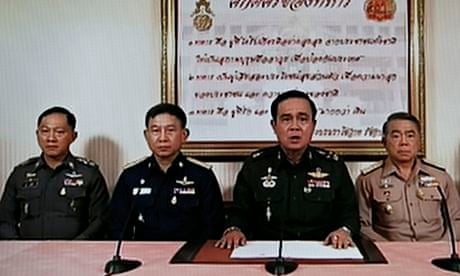
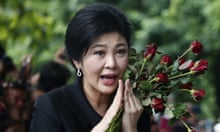

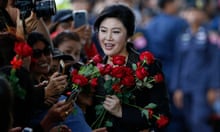


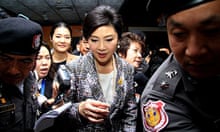
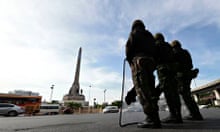
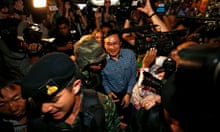
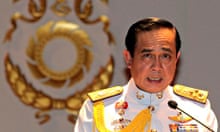
Comments (…)
Sign in or create your Guardian account to join the discussion